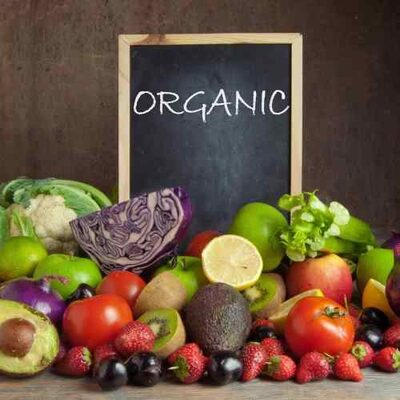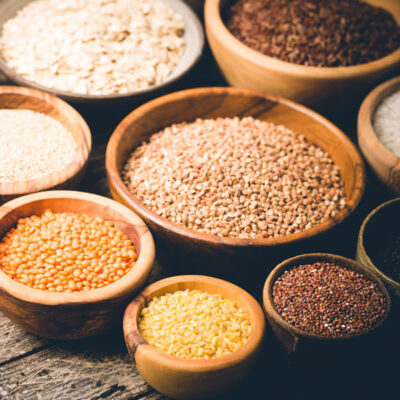Understanding Organic Food: What Does It Really Mean?
Author: admin Date Posted:30 November 2023

Organic v conventional Foods. In this article, we present the facts about organic food and consider why it may be relevant in today's climate even more so than ever.
An Introduction to Organic Food
Organic food refers to products that are grown or raised without the use of synthetic pesticides, chemical fertilizers, genetically modified organisms, or growth hormones. This method of farming emphasizes the use of renewable resources and the conservation of soil and water to enhance environmental quality for future generations. It's about a commitment to agricultural practices that strive for a balance with nature, focusing on the long-term sustainability of the entire ecosystem.
The history of organic farming
The concept of organic farming is not a new one. It dates back to the early 20th century when it gained momentum during the 1940s as a reaction to the industrialization of agriculture. Groundbreaking pioneers like Sir Albert Howard, Lady Eve Balfour, and J.I. Rodale began propounding the idea of a holistic, ecological, and health-promoting form of farming.
Their philosophies were based on a strong objection to chemical fertilizers and pesticides, and a dedication to soil health, biodiversity, and ecological balance. Their ideas and practices laid the foundation of what we now recognize as organic farming, marking a significant shift from conventional farming methods and principles.
Organic vs Conventional Foods
When comparing organic and conventional food, a key difference lies in the approach to farming.
Organic farming methods
Organic farming uses natural processes and materials, aiming to prioritise the health of soils, ecosystems, and people. This method shuns the use of synthetic pesticides, genetically engineered seeds, and chemical fertilizers, instead opting for organic fertilizers like compost and manure. Organic farmers also apply crop rotation and other forms of biological diversity to disrupt the habitat of pests and diseases.
Conventional farming methods
In contrast, conventional farming often employs synthetic chemicals to enhance the growth of crops and livestock, control pests, and combat diseases. It relies heavily on fertilizers for soil fertility and genetically modified organisms (GMOs) to increase crop yield. Conventional farming typically prioritizes maximizing productivity and profit, even if it sometimes comes at the expense of long-term sustainability.
These fundamental differences in farming can have significant impacts on the environment, health, and the quality of the food itself.
Yet the production of organic food does not stop at the farm gate. Most of the food that we eat undergoes some form of further processing before it reaches our shopping basket. We look at what happens to food once it leaves the farm in our article about choosing organic groceries beyond produce.
But what about flavour?
Does organic food taste different to conventional food?
The taste of organic food compared to conventional food often sparks lively debate. While some firmly believe organic food tastes better, attributing this to the absence of synthetic chemicals and more nutrient-rich soils, others don’t perceive a significant difference.
Scientifically speaking, the taste of food is influenced by various factors, such as the quality of the soil it's grown in, the weather conditions, and when it's harvested. Therefore, the flavours can vary widely, regardless of the farming method. However, choosing organic can often mean supporting small-scale farmers and artisanal producers whose methods prioritise flavour above yield.
And what about health?
Is organic food actually better for you?
The health benefits of organic food are a subject of ongoing research and debate. However, several studies have found that organic foods contain higher levels of certain nutrients, including antioxidants, than their conventionally grown counterparts.
What's more, people often choose organic food in order to avoid exposure to harmful pesticides used in conventional farming. You can read more about the subject in our article exploring pesticides in food.
Yet, it's essential to note that a balanced, varied diet based on whole, natural food, is key to health, regardless of whether the food consumed is organic or not. The World Health Organization, among others, emphasizes the importance of consuming a wide range of fruits, vegetables, lean proteins, and whole grains for maintaining good health.
The Environmental Benefits of Organic Food
As we have seen, organic farming practices are designed to be more sustainable and respectful of the environment. Here are a few key benefits:
Reduced Pollution: Organic farming avoids the use of synthetic pesticides and fertilizers, which can contaminate water, soil, and air.
Biodiversity Protection: Organic farms tend to house a greater diversity of plants, animals, and microorganisms than conventional farms, contributing to the preservation of ecosystem health and resilience.
Soil Health: Organic practices such as crop rotation, intercropping, and the use of organic fertilizers can enhance soil fertility and structure, leading to more productive soil over time.
Climate Change Mitigation: Organic farms often have lower greenhouse gas emissions compared to conventional farms, partly due to their exclusion of synthetic fertilizers. Some practices, like green manuring and composting, can even increase soil's capacity to absorb carbon, contributing to climate change mitigation.
Energy Efficiency: Organic farming typically requires less energy, primarily due to the omission of synthetic fertilizers and pesticides.
Organic Food Labelling and Regulations
Across the globe, the labelling of organic food is regulated by a variety of standards and certification bodies, ensuring that consumers are informed about the origin and production methods of the foods they purchase. These regulations seek to verify that organic foods uphold the principles of organic farming, such as the prohibition of synthetic pesticides and GMOs.
Whilst each country has its own set of regulations, the global approach upholds similar standards to organic food labelling that helps consumers make informed decisions about their purchases and supports the growth of sustainable farming practices.
In Australia, organic food labelling is regulated by the Australian Certified Organic (ACO) and the National Association for Sustainable Agriculture, Australia (NASAA). These certification bodies provide a range of organic certifications depending on the level of organic integrity achieved by the farm or producer. For example, ACO provides three levels of certification: "Organic," "In Conversion to Organic," and "Made with Organic Ingredients."
Organic food certification in Australia
In Australia, there are three levels of organic food certification, each indicating a different level of adherence to organic farming principles. The first level is "Organic." This certification is awarded to farms or producers who fully meet the requirements of organic farming. They have successfully eliminated the use of synthetic pesticides and GMOs, and follow sustainable farming practices.
The second level is "In Conversion to Organic." This certification is given to farms and producers transitioning from conventional to organic farming methods. They are in the process of eliminating synthetic inputs and shifting to sustainable farming methods, but haven't fully met all the criteria for the "Organic" certification yet. This transition period usually lasts three years.
The final level is "Made with Organic Ingredients." This label is used for products that contain a significant proportion of organic ingredients, typically at least 70%. While they contain organic ingredients, they might not be fully organic because the product may still contain some non-organic ingredients. However, all non-organic ingredients are strictly regulated and must meet certain criteria to be included in these products.
The Cost of Organic Food
Organic food is often criticised for its higher price point than conventional food, and even accused of being elitist. It's a huge debate, with many considerations to be taken into account. But why is organic food usually more expensive?
Factors influencing the cost of organic food
Several factors contribute to the higher cost of organic food.
Organic farming is a more labour-intensive process than conventional farming due to the absence of synthetic pesticides and fertilizers, requiring more manual effort in weeding, pest control, and maintenance of soil fertility.
Organic farms tend to be smaller in scale, which can increase costs on a per-unit basis.
The organic certification process itself is expensive, with farms required to pay annual inspection and certification fees.
Post-harvest handling of organic produce often requires separate processing facilities to prevent cross-contamination with non-organic products, adding to the overall cost.
Lastly, organic farming practices are more sustainable and environmentally friendly, but they often yield less product per acre of land compared to conventional farming methods. All these factors combined, result in a higher retail price for organic food.
We have tried to present a complete picture that clearly outlines what organic food really means. With climate change at the top of the agenda, organic food is once again at the forefront of the agenda. With a shift of focus on the environmental benefits for our planet, rather than the potential individual benefits of nutritional values, many people are rethinking their stance on the organic food debate.
Remember that choosing organic food is a personal decision, influenced by various factors such as health concerns, taste preference, environmental considerations, and financial ability. It's always a good idea to stay informed and make choices that align with your values and circumstances.
Explore our range of organic food products, and discover some new store cupboard staples today.



